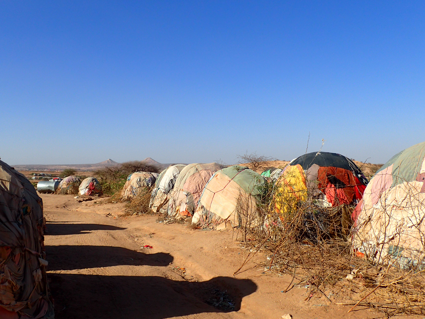Hargeisa is the capital of Somaliland, a former British colony which unilaterally declared independence from the rest of Somalia in 1991. A brutal civil war between 1988-91 resulted in most of the city being destroyed. After 25 years of rebuilding amidst a climate of relative peace, the city now has an estimated one million people living there and is continuing to grow.
The team is working in three communities in Hargeisa: the State House in the city centre, Camp A and Digaale Camp located on the outskirts of the city. The settlements have houses and huts made from corrugated iron, recycled plastic, cloth and any other materials people can patch together to make a shelter.
Security of tenure is a big issue in the city. The State House settlement is located on public land near the centre of the Hargeisa. Established in 1991, this camp houses 4,500 families and the people who live here are worried that they will be forced to move on when the government eventually decides – as they surely will – to use the land. The other two settlements, Camp A and Digaale Camp, are located at the edge of the city. Camp A is located on private land where there is no assurance that the migrants can remain. The families that live here hope that they will be able to resettle to a more permanent location. In contrast, the residents of Digaale Camp have been assured they can stay and so the 900-family community is now beginning to invest in the area. They live in more permanent metal houses built with the limited support of the Norwegian Refugee Council (NRC), Danish Refugee Council (DRC) and the European Union (ECHO).
People have moved to Hargeisa for a variety of reasons. The construction boom in the city has started to draw people from other areas, but environmental change has also been a strong factor. The drought of 2011 was the most severe in living memory, and many pastoralists lost livestock so they moved to Hargeisa in search of work to support themselves and their families. The situation was worsened during another serious drought in 2017. But the migrants have little in the way of skills or tools to find other employment so many have resorted to crushing rocks to sell to the gravel industry.
